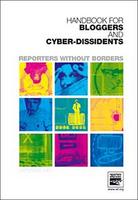Handbook for bloggers and cyber-dissidents
 Bloggers have made an invaluable contribution to getting information out of repressive countries, often at great personal risk. Bloggers like Mr Behi – who blogs from the Islamic Republic of Iran - provide valuable insights and information into human rights abuses there. The power of online communication is recognised by repressive governments like the one Mr Behi lives under. They use online agent provocateurs to entrap people – like Amir, a young gay man found out to his cost.
Bloggers have made an invaluable contribution to getting information out of repressive countries, often at great personal risk. Bloggers like Mr Behi – who blogs from the Islamic Republic of Iran - provide valuable insights and information into human rights abuses there. The power of online communication is recognised by repressive governments like the one Mr Behi lives under. They use online agent provocateurs to entrap people – like Amir, a young gay man found out to his cost.The Internet giants Yahoo! and Microsoft have been embroiled in a controversy after it agreed to help Chinese officials censor online information.
But now, The Times reports:
Would-be webloggers living under repressive regimes from China to Iran can now download an online handbook on how to become a successful "cyber-dissident".
Reporters sans frontières have published a Handbook for bloggers and cyber-dissidents which is available for download from their website. They say:
Blogs get people excited. Or else they disturb and worry them. Some people distrust them. Others see them as the vanguard of a new information revolution. Because they allow and encourage ordinary people to speak up, they’re tremendous tools of freedom of expression.
Bloggers are often the only real journalists in countries where the mainstream media is censored or under pressure. Only they provide independent news, at the risk of displeasing the government and sometimes courting arrest.
Reporters Without Borders has produced this handbook to help them, with handy tips and technical advice on how to to remain anonymous and to get round censorship, by choosing the most suitable method for each situation. It also explains how to set up and make the most of a blog, to publicise it (getting it picked up efficiently by search-engines) and to establish its credibility through observing basic ethical and journalistic principles.
The Handbook, which is also available to read online, deals with technical issues like setting up and running a blog, and how to ensure anonymity, as well as covering theoretical issues like media ethics and stylistic niceties.
Well worth a read for anyone who writes. According to The Times story:
"Seventy-five cyber-dissidents are currently in prison for trying to post independent news online, some of them serving sentences of more than 10 years."
Sobering.

0 Comments:
Post a Comment
<< Home